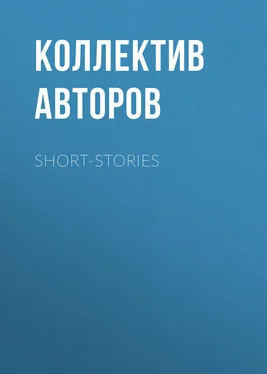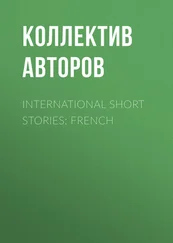Коллектив авторов - Short-Stories
Здесь есть возможность читать онлайн «Коллектив авторов - Short-Stories» — ознакомительный отрывок электронной книги совершенно бесплатно, а после прочтения отрывка купить полную версию. В некоторых случаях можно слушать аудио, скачать через торрент в формате fb2 и присутствует краткое содержание. Жанр: foreign_antique, foreign_prose, Детская проза, на английском языке. Описание произведения, (предисловие) а так же отзывы посетителей доступны на портале библиотеки ЛибКат.
- Название:Short-Stories
- Автор:
- Жанр:
- Год:неизвестен
- ISBN:нет данных
- Рейтинг книги:5 / 5. Голосов: 1
-
Избранное:Добавить в избранное
- Отзывы:
-
Ваша оценка:
- 100
- 1
- 2
- 3
- 4
- 5
Short-Stories: краткое содержание, описание и аннотация
Предлагаем к чтению аннотацию, описание, краткое содержание или предисловие (зависит от того, что написал сам автор книги «Short-Stories»). Если вы не нашли необходимую информацию о книге — напишите в комментариях, мы постараемся отыскать её.
Short-Stories — читать онлайн ознакомительный отрывок
Ниже представлен текст книги, разбитый по страницам. Система сохранения места последней прочитанной страницы, позволяет с удобством читать онлайн бесплатно книгу «Short-Stories», без необходимости каждый раз заново искать на чём Вы остановились. Поставьте закладку, и сможете в любой момент перейти на страницу, на которой закончили чтение.
Интервал:
Закладка:
Short-Stories
A PREFATORY NOTE
This collection of short-stories does not illustrate the history of short-story writing, nor does it pretend that these are the ten best stories ever written, but it does attempt to present selections from a list of the greatest short-stories that have proved, in actual use, most beneficial to high school students.
The introduction presents a concise statement of the essentials of the history, qualities, and composition of the short-story. A brief biography of each author and a criticism covering the main characteristics of his writings serve as starting points for the recitation. The references following both the biography and criticism are given in order that the study of the short-story may be amplified, and that high school teachers may build a systematic and serviceable library about their class work in the teaching of the story. The collateral readings, listed after each story, will aid in the creation of a suitable atmosphere for the story studied, and explain many questions developed in the recitation. Only such definitions as are not easily found in school dictionaries are included in the notes.
CONTENTS
PREFATORY NOTE
INTRODUCTION:
History of the Short-story
Qualities of the Short-story
Composition of the Short-story
Books for Reference
Collections of Short-stories
THE FATHER. 1860. Björnstjerne Björnson.
THE GRIFFIN AND THE MINOR CANON. 1887. Frank R. Stockton.
THE PIECE OF STRING. 1884. Guy de Maupassant.
THE MAN WHO WAS. 1889. Rudyard Kipling.
THE FALL OF THE HOUSE OF USHER. 1839. Edgar Allan Poe.
THE GOLD-BUG. 1843. Edgar Allan Poe.
THE BIRTHMARK. 1843. Nathaniel Hawthorne.
ETHAN BRAND. 1848. Nathaniel Hawthorne.
THE SIRE DE MALÉTROIT'S DOOR. 1878. Robert Louis Stevenson.
MARKHEIM. 1884. Robert Louis Stevenson.
INTRODUCTION
HISTORY OF THE SHORT-STORY
Just when, where, and by whom story-telling was begun no one can say. From the first use of speech, no doubt, our ancestors have told stories of war, love, mysteries, and the miraculous performances of lower animals and inanimate objects. The ultimate source of all stories lies in a thorough democracy, unhampered by the restrictions of a higher civilization. Many tales spring from a loathsome filth that is extremely obnoxious to our present day tastes. The remarkable and gratifying truth is, however, that the short-story, beginning in the crude and brutal stages of man's development, has gradually unfolded to greater and more useful possibilities, until in our own time it is a most flexible and moral literary form.
The first historical evidence in the development of the story shows no conception of a short-story other than that it is not so long as other narratives. This judgment of the short-story obtained until the beginning of the nineteenth century, when a new version of its meaning was given, and an enlarged vision of its possibilities was experienced by a number of writers almost simultaneously. In the early centuries of story-telling there was only one purpose in mind – that of narrating for the joy of the telling and hearing. The story-tellers sacrificed unity and totality of effect as well as originality for an entertaining method of reciting their incidents.
The story of Ruth and the Prodigal Son are excellent short tales, but they do not fulfill the requirements of our modern short-story for the reason that they are not constructed for one single impression, but are in reality parts of possible longer stories. They are, as it were, parts of stories not unlike Dr. Jekyll and Mr. Hyde and A Lear of the Steppes , and lack those complete and concise artistic effects found in the short-stories, Markheim and Mumu , by the same authors. Both Ruth and the Prodigal Son are exceptionally well told, possess a splendid moral tone, and are excellent prophecies of what the nineteenth century has developed for us in the art of short-story writing.
The Greeks did very little writing in prose until the era of their decadence, and showed little instinct to use the concise and unified form of the short-story. The conquering Romans followed closely in the paths of their predecessors and did little work in the shorter narratives. The myths of Greece and Rome were not bound by facts, and opened a wonderland where writers were free to roam. The epics were slow in movement, and presented a list of loosely organized stories arranged about some character like Ulysses or AEneas.
During the mediaeval period story-tellers and stories appeared everywhere. The more ignorant of these story-tellers produced the fable, and the educated monks produced the simple, crude and disjointed tales. The Gesta Romanorum is a wonderful storehouse of these mediaeval stories. In the Decameron Boccaccio deals with traditional and contemporary materials. He is a born story-teller and presents many interesting and well-told narratives, but as Professor Baldwin 1 1 American Short-Stories , by Charles Sears Baldwin, New York: Longmans, Green, & Company, 1904.
has said, more than half are merely anecdotes, and the remaining stories are bare plots, ingeniously done in a kind of scenario form. Three approach our modern idea of the short-story, and two, the second story of the second day and the sixth story of the ninth day, actually attain to our standard. Boccaccio was not conscious of a standard in short-story telling, for he had none in the sense that Poe and Maupassant defined and practiced it. Chaucer in England told his stories in verse and added the charm of humor and well defined characters to the development of story-telling.
In the seventeenth century Cervantes gave the world its first great novel, Don Quixote . Cervantes was careless in his work and did not write short-stories, but tales that are fairly brief. Spain added to the story a high sense of chivalry and a richness of character that the Greek romance and the Italian novella did not possess. France followed this loose composition and lack of beauty in form. Scarron and Le Sage, the two French fiction writers of this period, contributed little or nothing to the advancement of story-telling. Cervantes' The Liberal Lover is as near as this period came to producing a real short-story.
The story-telling of the seventeenth century was largely shaped by the popularity of the drama. In the eighteenth century the drama gave place to the essay, and it is to the sketch and essay that we must go to trace the evolution of the story during this period. Voltaire in France had a burning message in every essay, and he paid far greater attention to the development of the thought of his message than to the story he was telling. Addison and Steele in the Spectator developed some real characters of the fiction type and told some good stories, but even their best, like Theodosius and Constantia , fall far short of developing all the dramatic possibilities, and lack the focusing of interest found in the nineteenth century stories. Some of Lamb's Essays of Elia , especially the Dream Children , introduce a delicate fancy and an essayist's clearness of thought and statement into the story. At the close of this century German romanticism began to seep into English thought and prepare the way for things new in literary thought and treatment.
The nineteenth century opened with a decided preference for fiction. Washington Irving, reverting to the Spectator , produced his sketches, and, following the trend of his time, looked forward to a new form and wrote The Spectre Bridegroom and Rip Van Winkle . It is only by a precise definition of short-story that Irving is robbed of the honor of being the founder of the modern short-story. He loved to meander and to fit his materials to his story scheme in a leisurely manner. He did not quite see what Hawthorne instinctively followed and Poe consciously defined and practiced, and he did not realize that terseness of statement and totality of impression were the chief qualities he needed to make him the father of a new literary form. Poe and Maupassant have reduced the form of the short-story to an exact science; Hawthorne and Harte have done successfully in the field of romanticism what the Germans, Tieck and Hoffman, did not do so well; Bjornson and Henry James have analyzed character psychologically in their short-stories; Kipling has used the short-story as a vehicle for the conveyance of specific knowledge; Stevenson has gathered most, if not all, of the literary possibilities adaptable to short-story use, and has incorporated them in his Markheim .
Читать дальшеИнтервал:
Закладка:
Похожие книги на «Short-Stories»
Представляем Вашему вниманию похожие книги на «Short-Stories» списком для выбора. Мы отобрали схожую по названию и смыслу литературу в надежде предоставить читателям больше вариантов отыскать новые, интересные, ещё непрочитанные произведения.
Обсуждение, отзывы о книге «Short-Stories» и просто собственные мнения читателей. Оставьте ваши комментарии, напишите, что Вы думаете о произведении, его смысле или главных героях. Укажите что конкретно понравилось, а что нет, и почему Вы так считаете.

![Коллектив авторов - Best Short Stories [С англо-русским словарем]](/books/26635/kollektiv-avtorov-best-short-stories-s-anglo-thumb.webp)










